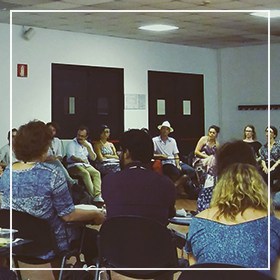At the last European Association of Social Anthropology (EASA) meeting, a few of us called an open meeting for early career and precarious anthropologists to discuss precarity in academia and beyond. The call emerged from a number of informal conversations and private/public exchanges (see, e.g., the exchange on the COMPAS call for ‘casual researchers,’ and the recent Guardian report on precarious lecturers), and a shared awareness that, while precarity is on the rise within and beyond anthropology, there is no collective anthropology platform specifically dedicated to it.
The meeting in Milan was an effort to address the projectarization and precarization of anthropologists’ working conditions.
It aimed to create a space for early career researchers to collectively explore possible paths for transnational labour organisation and action, to make our rights visible and our work possible. Here is the original call:
Uncertainty and precarity have long been an integral part of anthropology – part of the excitement, serendipity, danger and thrill of fieldwork and theory. Yet today, most researchers encounter these conditions in more than one way. Many of us are caught in short fixed-term contracts, with limited bargaining power and social security/benefits (often without health insurance, pension, holiday, redundancy, or even maternity/parental leave). We are working under the burden of the ‘publish or perish’ imperative and have to secure research and teaching experience (sometimes unpaid) while realizing our work benefits not the public, but profit-making universities and publishers. In this meeting we open a collaborative, transnational, and experimental space for early career anthropologists and precarious scholars in order to:
- discuss the current predicament of the academic profession and differences across multiple contracts and positions and discrepancies between national contexts and transnational schemes (ERC, Marie Curie, etc.), the changing structure of funding and the projectarization of research, labour hierarchies, autonomy and control of knowledge production.
- seek possible paths for labour organization and action.
- brainstorm around possible ways to collectively intervene and make our rights/entitlements visible.
- think of collaborations with already existing networks (EASA, national academic unions…)
The meeting aims to move beyond self-pity, overcome hyper-fragmentation and fear, and organize collectively before the changes in place make solidarity across positions, contracts, and contexts impossible.
Everybody Welcome!
Perhaps unsurprisingly, the meeting was one of the best-attended EASA2016 events, with more than 150 people participating. A number of topics were discussed, including:
- the seismic rise of precarious teaching and research contracts across Europe
- the radical difference between countries and between contracts, and the detrimental effects this has on the possibility of solidarity, collaboration, and alliance between precarious anthropologists
- the way in which precarity and the requirement of mobility affects personal lives, including the lives of young parents and the balancing of career and caring demands
- the divisions across Europe, where different economic and payment conditions create a reserve army of workers in the East and South available for precarious academic migration to the North and West
- the difficulty in obtaining information – internationally, nationally, and institutionally – about specific contractual arrangements
- the arrangements between research and teaching-replacement staff in large EU-funded projects, where often a race to the bottom is created and reinforced by conditions stipulated by funding agencies and host institutions
- the fact that many institutions, departments, and individual (often precarious) scholars are required to dedicate time and effort to research grants applications, only a small proportion of which will obtain funding
- the difficulty in creating alliances with precarious research and teaching staff from other disciplines, and particularly in the natural sciences
- the hierarchical and personalised structure of most collaborative research projects, which often leaves junior researchers ‘dependant’ on their project manager/principal investigator/supervisor, and sometimes with limited control or ownership of their own knowledge production
- discrimination surrounding caring responsibilities and maternity
- the need to think beyond Europe, and build alliances with precarious scholars internationally
At the PrecAthro EASA2016 meeting we took three main decisions: (1) present a motion to the EASA Executive Committee regarding the situation of precarious anthropologists, (2) build a collective PrecAnthro platform for communication and action, (3) form working groups to tackle specific issues.
(1) PrecAnthro Motion
PrecAnthro presented a motion to the EASA Executive Committee during the Members’ Forum in Milan – here is the text:
We would like EASA members present at this general assembly to consider and support the following motion: We ask the EASA executive to discuss these points at their next meeting and vote on these proposals.
Some background first:
On the 22nd of July a meeting took place during the EASA biannual conference.
Organized and attended by precarious anthropologists on PhD, teaching and researchers’ contracts, it asked EASA as a professional organization to support the plight of precarious anthropologists in a number of ways.
- Preparing a declaration in which EASA – acknowledging the overall predicament of the academic profession in the era of advanced capitalism – declares itself against the proliferation of precarity on anthropology departments across Europe and beyond
- Updating – with input by those affected – the existing database on number and types of contracts on anthropology departments across Europe in order to better understand the current situation with precarity in the profession
- Discussing concrete ways in which the association – with help and input of those affected – can help watchdog efforts and assert influence in clear cases of exploitation and proliferation of precarity in departments of anthropology or among members of EASA
- Creating a policy of good practice in recruitment and employment
- Involving precarious academics in the efforts to lobby the European Commission on issues of the structuring requirements and procedures of hiring (of researchers and replacement teaching staff), research, administration and academic production within EU projects

(2) PrecAnthro platform
A PrecAnthro online platform was set up in August 2016 – below is the link, in addition to our other social media handles:
PrecAnthro Group: precanthro@googlegroups.com
Email: precanthro@gmail.com
Facebook: https://www.facebook.com/precanthro
Twitter: #PrecAnthro
PrecAnthro Watchdog Group: precanthro.watchdog@gmail.com
The PrecAnthro Watchdog Group deals with particular labour issues demanding urgent collective response. PrecAnthro members can report at precanthro.watchdog@gmail.com specific irregularities in their working environments, and they can discuss/decide on the most suited PrecAnthro intervention. Because of the sensitive nature of these cases and the need for anonymity/trust, all emails received to this account will be treated confidentially.
(3) Working groups
PrecAnthro now has four working groups up and running – If you wish to join one of the working groups, please email (specifying the group) precanthro@gmail.com.
- Web platform – social media, press releases. This group is the ‘public face’ of PrecAnthro’s internal discussions. Right now we run a facebook and a twitter account (with the aim of also creating a blog/website). The aim of this group is to share information about naming-and-shaming precarious positions, articles about precarity among anthropologists and related fields in Europe and beyond, as well as compiling and distributing press-releases on our activities (e.g., responses to articles which mis/represent a specific event/situation, petitions, reporting on successes/failures of struggle against precarity, reporting on precarity-related events).
- Policy – recommendations to departments, funders, employers, national unions. The aim of this group is to collect, discuss, and compile recommendations, guidelines, and ‘good practice’ advice for departments, funders (e.g., ERC), supervisors and PIs, scholarly organisations (e.g., EASA), national unions, and other bodies who work with precarious scholars (e.g., research and teaching staff on temporary contracts). The aim is both to highlight the situation of precarious scholars and provide practical advice and critical solutions – in the short and the long term.
- Research – database on precarity & existing struggles. This group is responsible for gathering information regarding at least two domains: first, the labour conditions of precarious anthropologists in various departments/projects in Europe; and, second, existing unionizing and struggles around relevant labour issues. The ultimate goal is to create a database that will directly feed our watchdog and policy activities, and inform possibilities of collaboration with other networks/struggles.
- Ethics – ethics of PrecAnthro on research, participation, etc. This group will work closely with other working groups responding to their needs for developing procedural and ethical standards. These can range from suggesting ways to handle confidential issues, e.g., through elaborating guidelines for using the PrecAnthro mailing list, to facilitating discussions around and drafting bylaws for the union. The group will also be reflecting on effective ways to store, preserve and share documents produced for internal use (e.g., research protocols), and will be attending individual members’ complaints about ethical and procedural shortcomings.
PreAnthro is a collective, experimental, and open endeavour – join us, invite your colleagues, spread the word, and join the struggle!
Featured image by Beth Scupham (flickr, CC BY 2.0)





